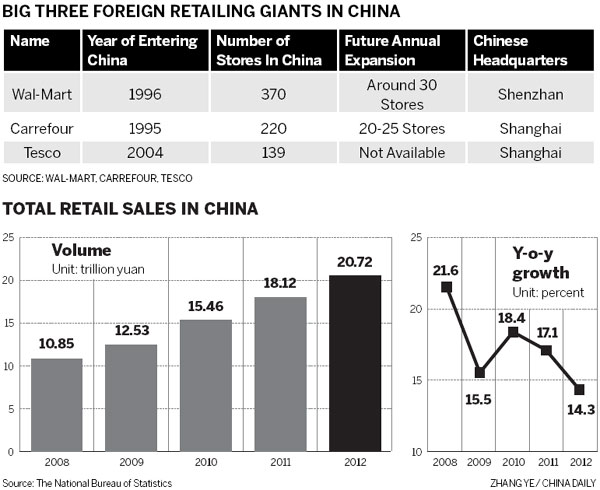Food for thought in the retail business
Updated: 2013-04-01 02:41
By LI WOKE (China Daily)
|
|||||||||||
Chinese players
Some Chinese players also did very well last season. Yonghui Superstores Co has been emerging as the fastest-growing retailer in the industry. The Fujian-based supermarket chain said it plans to have 350 stores and 50 billion yuan in sales revenue by 2014.
According to Kantar Worldpanel, Yonghui continues to grow on an annual basis through its expansion into new provinces, allowing the retailer to reach more Chinese households. Yonghui's growth has been most impressive in Beijing where 28 percent of households have now visited the store over the last 52 weeks.
"The success of Yonghui is mainly down to our business model, focusing on the fresh products section, which occupies around 40 to 50 percent of store floorspace," said Ye Changqing, a representative of Yonghui's chairman office. "The fresh goods we are selling are directly delivered from the production bases in order to save costs."
"Compared with local retailers, foreign retailers have better logistics and management skills but they have fewer resources in regional areas," said Chu Dong, vice-secretary-general of China Chain Store and Franchise Association.
"Local retailers have great strengths by knowing what the neighborhood really needs, especially in the fresh goods sector, which can eventually win over local customers' hearts," said Millward Brown's Wang.
Chu added that this year most of the retailers, both domestic and foreign, will focus on same-store sales rather than expansion speed after considering rising labor and property costs.
"Our annual new store target — 20 to 25 stores per year — is a good balance between expansion speed and quality. If the speed is too slow, we will lose the market. If it's too fast, we may sacrifice quality," said Thierry Garnier, president and chief executive officer of Carrefour China.
"Currently, China has entered into a stable development period in the retail sector. In the future all retailers will have to look at untouched areas, such as those to the west or in the countryside," said Wang Tian, chairman of the Hunan-based Better-Life Commercial Chain Share Co.
He added the company will accelerate expansion in Jiangxi, Yunnan and Hunan provinces.
Metro said when it plans to enter a new market, it looks for cities with a good existing base and further potential to support its business model. This means it will look at the local economic development level and infrastructure, disposable income level, as well as local professional customer base including the number and scale of hotels, restaurants, canteens, offices and their market outlook.
"Retailers cannot merely rely on offering low-price goods in order to survive in the market," said Wang. "They should differentiate their markets and provide face-to-face services and lifestyle experiences for customers."
"The next three to five years will be a crucial period for China's economic transition and also a transition period from buying necessities to purchasing a comfortable or luxury lifestyle," said Jason Yu, general manager at Kantar Worldpanel China.
Garnier said: "The rapid development of China's economy and purchasing power of the citizens bring a great opportunity to retailing. Whether it's international or local retailers, their business, product quality, services and supply chain integration will expand."

Contact the writer at liwoke@chinadaily.com.cn
Related Stories
Bank plans to promote retail business 2013-03-30 01:42
Online retailing spurs changes in economy, study says 2013-03-26 10:32
Growth of total retail sales was slowed 2013-03-20 10:03
Retail giants accelerate expansion in China 2013-03-19 21:17
Standard Chartered invests in children’s retailer 2013-03-18 19:53
China's retail sales up 12.3% during Jan-Feb 2013-03-09 14:00
Today's Top News
Police continue manhunt for 2nd bombing suspect
H7N9 flu transmission studied
8% growth predicted for Q2
Nuke reactor gets foreign contract
First couple on Time's list of most influential
'Green' awareness levels drop in Beijing
Palace Museum spruces up
Trading channels 'need to broaden'
Hot Topics
Lunar probe , China growth forecasts, Emission rules get tougher, China seen through 'colored lens', International board,
Editor's Picks

|

|

|

|

|

|





